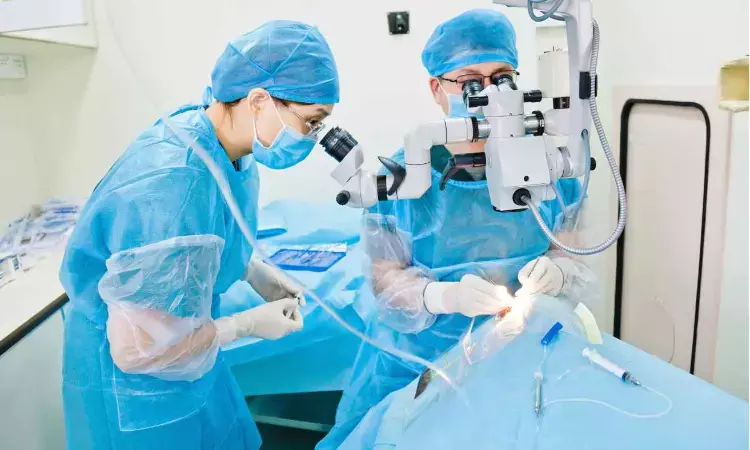- Home
- Medical news & Guidelines
- Anesthesiology
- Cardiology and CTVS
- Critical Care
- Dentistry
- Dermatology
- Diabetes and Endocrinology
- ENT
- Gastroenterology
- Medicine
- Nephrology
- Neurology
- Obstretics-Gynaecology
- Oncology
- Ophthalmology
- Orthopaedics
- Pediatrics-Neonatology
- Psychiatry
- Pulmonology
- Radiology
- Surgery
- Urology
- Laboratory Medicine
- Diet
- Nursing
- Paramedical
- Physiotherapy
- Health news
- Fact Check
- Bone Health Fact Check
- Brain Health Fact Check
- Cancer Related Fact Check
- Child Care Fact Check
- Dental and oral health fact check
- Diabetes and metabolic health fact check
- Diet and Nutrition Fact Check
- Eye and ENT Care Fact Check
- Fitness fact check
- Gut health fact check
- Heart health fact check
- Kidney health fact check
- Medical education fact check
- Men's health fact check
- Respiratory fact check
- Skin and hair care fact check
- Vaccine and Immunization fact check
- Women's health fact check
- AYUSH
- State News
- Andaman and Nicobar Islands
- Andhra Pradesh
- Arunachal Pradesh
- Assam
- Bihar
- Chandigarh
- Chattisgarh
- Dadra and Nagar Haveli
- Daman and Diu
- Delhi
- Goa
- Gujarat
- Haryana
- Himachal Pradesh
- Jammu & Kashmir
- Jharkhand
- Karnataka
- Kerala
- Ladakh
- Lakshadweep
- Madhya Pradesh
- Maharashtra
- Manipur
- Meghalaya
- Mizoram
- Nagaland
- Odisha
- Puducherry
- Punjab
- Rajasthan
- Sikkim
- Tamil Nadu
- Telangana
- Tripura
- Uttar Pradesh
- Uttrakhand
- West Bengal
- Medical Education
- Industry
MELT-300 Demonstrates Successful Procedural Sedation for cataract extraction in new research

Melt Pharmaceuticals a clinical-stage pharmaceutical company developing novel approaches for procedural sedation, today announced positive topline results of its pivotal Phase 3 study evaluating the safety and efficacy of its lead product candidate, MELT‑300, a non-IV, non-opioid tablet for procedural sedation during cataract surgery. Based on a Special Protocol Assessment agreement reached with the U.S. Food and Drug Administration (“FDA”) earlier this year, this study design and these positive results support the necessary objectives required for a regulatory submission.
MELT-300 uniquely combines a fixed dose of midazolam (3mg) and ketamine (50mg) in one tablet that is administered sublingually using Catalent’s proprietary Zydis® delivery technology which dissolves in as little as 3 seconds allowing absorption of the active ingredients across the sublingual mucosa.
The MELT-300 Phase 3 clinical trial was a randomized, double-blind, three-arm study comparing, at a 4:1:1 ratio, MELT-300, sublingual midazolam, and sublingual placebo, respectively, for procedural sedation in patients undergoing cataract surgery. The study was conducted at 13 clinical sites in the United States and enrolled over 530 patients.
In commenting on the topline results, Dr. Larry Dillaha, Chief Executive Officer of Melt, said, “We are extremely excited with this robust topline data from our pivotal Phase 3 study. These overwhelmingly positive results support our belief that MELT-300, if approved by the FDA, would be a safe and effective non-IV, non-opioid alternative to current IV-based cataract surgery sedation protocols, which generally involve the administration of opioids. With the number of cataract surgeries performed each year in the U.S. expected to exceed 5 million in the coming years, we believe offering patients and physicians the ability to achieve an adequate sedation level without the need to start an IV or administer opioids is a very attractive proposition.”
MELT-300 co-inventor, Melt Pharmaceuticals board member, and board-certified ophthalmologist John Berdahl, M.D., commented, “A proprietary compounded combination of midazolam and ketamine, which was the inspiration for the development of the MELT-300 product candidate, has been used by hundreds of ophthalmologists, including myself – in hundreds of thousands of cataract surgeries. I am thrilled at the prospect of the FDA approving MELT-300, which I believe would greatly enhance the confidence of healthcare professionals in considering the adoption of this groundbreaking sedation method.”
George Magrath, M.D., a board-certified ophthalmologist and a MELT-300 Phase 3 study principal investigator, commented, “These Phase 3 data show the superiority of the combination of midazolam and ketamine compared with midazolam alone. If approved, I believe MELT-300 will be a safe and effective alternative to current sedation methods used for cataract surgery. As an ophthalmologist, I am excited about the prospect of using MELT-300 to enhance the overall experience for my cataract surgery patients.”
Dr. Dillaha continued, “In addition to supporting a regulatory submission, these MELT-300 Phase 3 data should further strengthen our already strong patent portfolio, both domestically and internationally. Further, with these data now confirming and complementing our robust Phase 2 efficacy and safety results, we believe we are well positioned to elevate the procedural sedation standard of care for cataract surgery and, through lifecycle management, eventually expand the potential use of MELT-300 to over 100 million annual procedures in various medical specialties, including dermatology, plastic surgery, dentistry, gastroenterology, and emergency care.
“Melt Pharmaceuticals is profoundly grateful to the Phase 3 MELT-300 study participants, whose involvement has been invaluable. This includes the ophthalmologists, optometrists, anesthesiologists, certified registered nurse anesthetists, staff, and patients at the 13 U.S. clinical sites.”
Dr Kamal Kant Kohli-MBBS, DTCD- a chest specialist with more than 30 years of practice and a flair for writing clinical articles, Dr Kamal Kant Kohli joined Medical Dialogues as a Chief Editor of Medical News. Besides writing articles, as an editor, he proofreads and verifies all the medical content published on Medical Dialogues including those coming from journals, studies,medical conferences,guidelines etc. Email: drkohli@medicaldialogues.in. Contact no. 011-43720751


